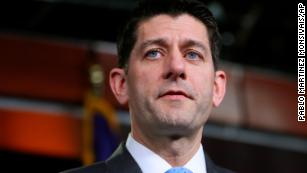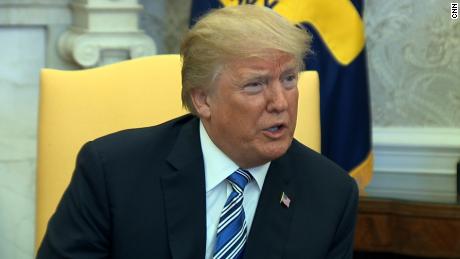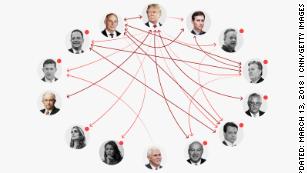Please don't start a global trade war, President Trump
David A. Andelman, visiting scholar at the Center on National Security at Fordham Law School and director of its Red Lines Project, is a contributor to CNN and columnist for USA Today. Author of "A Shattered Peace: Versailles 1919 and the Price We Pay Today," he formerly served as a foreign correspondent for The New York Times and CBS News in Asia and Europe. Follow him on Twitter @DavidAndelman. The views expressed in this commentary are his.
(CNN)What
Donald Trump clearly cannot see through the prism of his own warped
ideology is that the US is so far behind in its trade imbalance with the
world that no matter how many tariffs he imposes, the retaliation will
only leave it deeper in the hole with a damaged economy.
In short, he is risking kicking off a global trade war.
For
trade, unlike Trump's simplistic view, is not a zero-sum game. It's not
all about the dollars, it's about jobs. All this flailing effort at
rebalancing, imposed in an instant, could take decades to correct.
Meanwhile, millions of jobs risk being lost. We may save a few hundred
jobs in steel, and lose hundreds of thousands in automobiles, planes and
industries critical to our survival.
Gary Cohn, head of the White House Economic Council, clearly recognized this
and clearly could not visualize a viable path ahead for the American
economy if the President failed to recognize the existential dangers
toward which the Trump administration appeared hell-bent on plunging the
world.
Now he's gone and it's difficult to see any rational voice counseling restraint that remains between Trump and some economic Armageddon.
Let's
look at the logic. America's trade imbalance in goods with the European
Union was $151 billion last year ($435 billion in imports, $284 billion in exports.
Now,
say Trump imposes a major tariff on steel and aluminum, cutting back on
their exports to us, then Europe in turn imposes countervailing tariffs
on our exports to them, and Trump retaliates on European automobiles,
and they retaliate on American planes (critically damaging Boeing and
helping their own Airbus competitor).
Canada,
another victim of the Trump tariffs and the largest exporter of steel
to the US, would in turn likely go straight for the jugular -- American
agriculture, a total of $23 billion. Indeed, some 1.2 million jobs are
devoted to exports to Canada.
Brazil,
the second largest victim of Trump's steel tariffs, imported $900
million in agricultural products, as well as $4.8 billion in planes. All
those exports represented 128,000 American jobs.
What
is especially interesting is that all these figures come directly from
the Office of the United States Trade Representative. Yet somehow, none
of them seem to have made their way to President Trump, or at least made
much difference once they arrived.
But
there's much more trouble ahead. The rationale underpinning Trump's
steel and aluminum tariffs will have set a critical precedent -- the
President labeling them as being in defense of "national security."
That's
an escape clause in the World Trade Organization charter that is
designed to be invoked narrowly and only in the most dire circumstances.
Imagine that escape clause being invoked globally and routinely. The
broad use of this narrow path through and around the World Trade
Organization could (Trump's other big daydream) eviscerate that organization which America has supported from the get-go.
A
full-fledged global trade war would quickly and inevitably ensue. And
America, its economy, its currency, its stock market would truly be
brought to its knees. Of course, so would everyone else's.
This
risk did not suddenly appear on the horizon. Last year, the World Trade
Organization took up "two trade concerns raised at the 30 June meeting
of the Goods Council. The United States said it was investigating the
impact of steel and aluminum imports on national security while certain
Gulf states cited national security interests in a discussion on their
trade restrictions on Qatar."
The European Union warned,
then, that this clause could never be invoked "for the purpose of
protecting a domestic industry against foreign competition" and warned,
back then, of dire consequences including "systemic risks."
At
that meeting, in addition to the EU, Brazil, Australia, Taiwan, Japan
-- all loyal American allies -- as well as China and Russia, all weighed
in against invoking national security.
The
world has been there before -- long before the creation of the WTO in
1995 or even its predecessor, the General Agreement on Tariffs and Trade
after World War II. All of these were a reaction to the catastrophic
American Smoot-Hawley Tariff that in 1930 helped plunge the world into
the maelstrom of the Great Depression, compounding the 1929 stock market
crash.
Back then, President
Herbert Hoover, the Donald Trump of his day, had a trusted economic
adviser -- Thomas Lamont, a partner in J.P. Morgan bank (the Goldman
Sachs of its day). "I almost went down on my knees to beg Herbert Hoover
to veto the asinine Hawley-Smoot Tariff," Lamont later recalled. "That Act intensified nationalism all over the world." Sound familiar?
Many
of those defending the President's steel and aluminum tariffs, which
are expected to lead to -- among many other effects, including increased
inflation -- reply that "a little inflation isn't a bad thing." That we need to defend our ability to produce steel and aluminum at home.
Perhaps.
But then there are the lost jobs, dying exports and shuttered
factories, fallow farms. For all too often, ill-considered events can
quickly spiral into uncontrollable effects that can be reversed only at
enormous cost. Hopefully, another adviser to President Trump will
emerge, before it is too late, and go down on his knees, and this
president will listen.
Betty MacDonald, a very special politician and a year ago
Many ESC fans from all over the world are so very sad because we lost Joy Fleming - one of the best singers ever.
Betty MacDonald fan club founder Wolfgang Hampel sings 'Try to remember' especially for Betty MacDonald fan club organizer Linde Lund at Vita Magica September
Vita Magica Betty MacDonald event with Wolfgang Hampel, Thomas Bödigheimer and Friedrich von Hoheneichen
Betty MacDonald
Betty MacDonald forum
Wolfgang Hampel - Wikipedia ( Polski)
Wolfgang Hampel - LinkFang ( German )
Wolfgang Hampel - Academic ( German )
Wolfgang Hampel - cyclopaedia.net ( German )
Wolfgang Hampel - DBpedia ( English / German )
Wolfgang Hampel - people check ( English )
Wolfgang Hampel - Memim ( English )
Vashon Island - Wikipedia ( German )
Wolfgang Hampel - Monica Sone - Wikipedia ( English )
Wolfgang Hampel - Ma and Pa Kettle - Wikipedia ( English )
Wolfgang Hampel - Ma and Pa Kettle - Wikipedia ( French )
Wolfgang Hampel - Mrs. Piggle-Wiggle - Wikipedia ( English)
Wolfgang Hampel in Florida State University
Betty MacDonald fan club founder Wolfgang Hampel
Betty MacDonald fan club interviews on CD/DVD
Betty MacDonald fan club items
Betty MacDonald fan club items - comments
Betty MacDonald fan club - The Stove and I
Betty MacDonald fan club groups
Betty MacDonald fan club organizer Linde Lund
Betty MacDonald, a very special politician and a year ago
Betty MacDonald fan club founder Wolfgang Hampel sings 'Try to remember' especially for Betty MacDonald fan club organizer Linde Lund at Vita Magica September
you can join
Betty MacDonald fan club
Betty MacDonald Society
Vita Magica
Eurovision Song Contest Fan Club
on Facebook
Vita Magica Betty MacDonald event with Wolfgang Hampel, Thomas Bödigheimer and Friedrich von Hoheneichen
Vita Magica
Betty MacDonald
Betty MacDonald fan club
Betty MacDonald fan club on Facebook
Betty MacDonald forum
Wolfgang Hampel - Wikipedia ( English )
Wolfgang Hampel - Wikipedia ( English ) - The Egg and I
Wolfgang Hampel - Wikipedia ( Polski)
Wolfgang Hampel - Wikipedia ( German )
Wolfgang Hampel - LinkFang ( German )
Wolfgang Hampel - Academic ( German )
Wolfgang Hampel - cyclopaedia.net ( German )
Wolfgang Hampel - DBpedia ( English / German )
Wolfgang Hampel - people check ( English )
Wolfgang Hampel - Memim ( English )
Vashon Island - Wikipedia ( German )
Wolfgang Hampel - Monica Sone - Wikipedia ( English )
Wolfgang Hampel - Ma and Pa Kettle - Wikipedia ( English )
Wolfgang Hampel - Ma and Pa Kettle - Wikipedia ( French )
Wolfgang Hampel - Mrs. Piggle-Wiggle - Wikipedia ( English)
Wolfgang Hampel in Florida State University
Betty MacDonald fan club founder Wolfgang Hampel
Betty MacDonald fan club interviews on CD/DVD
Betty MacDonald fan club items
Betty MacDonald fan club items - comments
Betty MacDonald fan club - The Stove and I
Betty MacDonald fan club groups
Betty MacDonald fan club organizer Linde Lund



